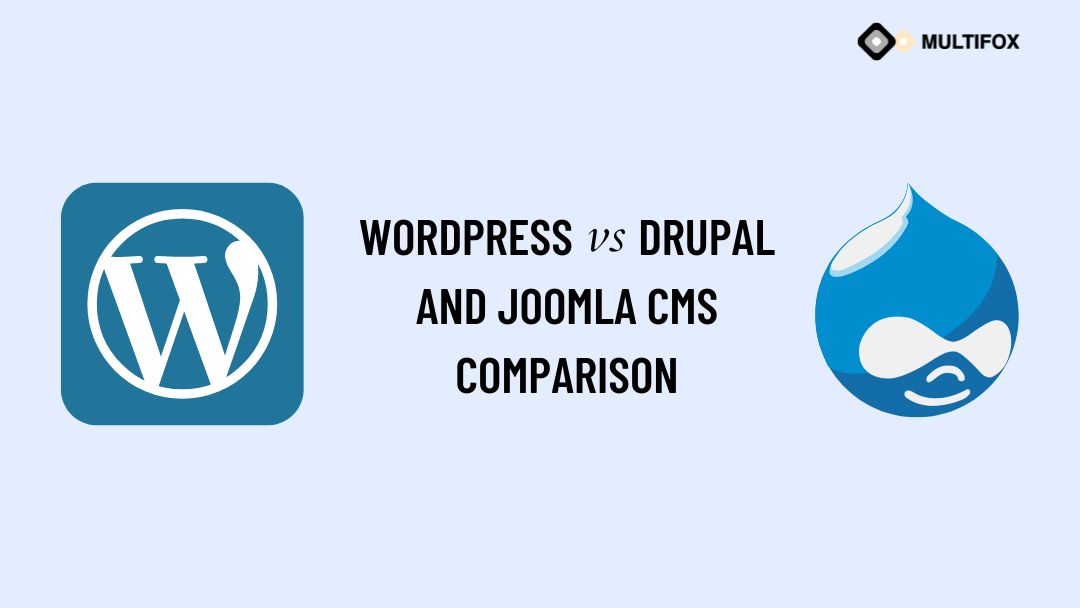If you’re planning on running or are currently running an educational website, then you should add an LMS or a learning management system plugin...
Here is a comparison of three different content management systems (CMS) – WordPress vs Drupal vs Joomla
To get started with the Content Management system (CMS), WordPress, Joomla, and Drupal are the most widely used CMS platforms in the world.
To choose the platform, it highly depends on your short and long-term goals to know which CMS platform is right for your service. If you are searching for an open-source and user-friendly approach to your CMS requirements, both frameworks will do so.
Nonetheless, once you begin to ask around, you may get a wide range of views about which platform is best based on what you are asking. For starters, if you ask an experienced web developer and a business person who is not very tech-savvy, you’ll probably get very different answers. But Why and How? They have very different technical capabilities, and they most likely have significantly different goals to achieve.
The Best three CMS platforms we are going to see in this article are,
- WordPress
- Drupal
- Joomla
There are very few feature comparisons to be observed between WordPress vs Drupal vs Joomla, whether you are a beginner or a skilled web developer.
Here you can view a quick view of the three platforms,
Table of Contents
CMS Comparision Table – WordPress – Drupal – Joomla
| CMS Comparision |  |  |  |
| Released On | 2003 | 2001 | 2003 |
| Downloads | 150 Million | 20 Million | 60 Million |
| Free Themes | 5,000+ | 2,000+ | 1000+ |
| Free Plugins | 55,000+ | 32,000+ | 7,700+ |
| Cost | – | – | – |
| Update Frequency | 45 Days | 30 Days | 35 Days |
| Number of websites | 34 Million | 1 Million | 2 Million |
| Installation Time | 5 Minutes | 10 Minutes | 10 Minutes |
| Best Used For | Blogs, News and Online Magazine, Ecommerce sites | Business, eCommerce, Content management, sites | Ecommerce, Social Networking websites |
| Top sites using | Time, CNN, The White House, Sony, Forbes | NBC, Warner Bros | Harvard, Linux, Ikea, McDonald |
| Pros | User-Friendly, SEO Friendly, Flexible and Responsive | Versatile, Flexible, Managing Multi-websites, Scalability | Powerful Interface, Custom Apps, Highly Active Developer Community |
| Cons | Customization Needs Coding, Requires Frequent Updates | Difficult for Newbies, Complex Interface |
Requires Large Server Resources, Complex Architecture, Plugin Compatibility |
WordPress Vs Drupal Vs Joomla – Detailed Comparison
Open-source CMS such as WordPress, Drupal, and Joomla makes it quick and easy to create a website. However, each one has its strengths and weaknesses.
Thinking about the costs of using any of these CMS is getting very tricky real quick. Each of these three great CMS is 100 completely free on its own, and you could either access one directly from the official websites in just a few clicks, however: there are several secondary costs to carry on board. Such additional costs primarily include two things: domain names and web hosting.
A domain name is the Web address of your Web site. Buying and managing an online domain costs about $15 per annum.
A web hosting system would be where your website lies and where it is accessible to your visitors.
WordPress – Content Management System
WordPress started out as a blogging platform and has now grown exponentially. It is the most common CMS in the world now. Over 34% of the overall sites running on a CMS are currently using WordPress.
Benefits of WordPress CMS:
- Simple to Beginners – For someone with no technical knowledge, there will be a very low learning curve.
- Huge library of Plug-ins – A number of WordPress plug-ins, themes, and customizations are available.
- Large Community Support – Millions of people are using WordPress, There was a large community for support. And there is a huge support forum full of contributors.
- Flexibility – WordPress can pretty much do anything. You can operate an e-commerce store, host a video website, represent a portfolio, or post a blog.
WordPress Disadvantages:
- Using more plugins might slow down the website.
- Large sites require considerable resources from the servers.
Drupal – Content Management System
Drupal is the second most commonly used open-source CMS. It is extraordinarily powerful. Drupa can be used from a simple blog to a complex content portal for large corporations and fits anything.
Advantages of Drupal CMS:
- Flexible and customizable – With several special plug-ins, themes, and other customizable possibilities, Drupal is easy to tweak. It may even modify the root files, turning it into the most powerful CMS.
- Setup on multiplatform – Drupal allows for fast development and testing for the configuration of multiple sites. You can also create your platform and sandbox at the same time.
- Community Support – There is a large community for Drupal. Support can be found on drupal.org, StackExchange, and other websites.
- Sustainable – Drupal ranges seamlessly and is robust even if it continues to serve thousands of users at once.
Disadvantages of Drupal:
Drupal might have been powerful, but it creates obstacles. Here are a few drawbacks:
- It comes with a Steep learning curve – A lot of technical knowledge is required for Drupal. If you need more than just a simple blog or small business website, you’ll need technical support. You need someone to build your website if you don’t have technical skills, add modules and provide support.
- Lacking Themes – Compared with WordPress, the number of themes is limited. For doing the job in Drupal, you’ll need to hire a professional designer if you really want an original or fresh template.
Joomla – Content Management System
Joomla is a WordPress to Drupal transition. It’s a powerful CMS running smoothly on most servers. This doesn’t require Drupal’s practical experience, but it offers a lot of features. Joomla has lots of plug-ins and templates to tailor your website.
Advantages of Joomla CMS
Joomla’s got a lot to offer. Reasons for selecting Joomla include:
- User-friendly – Joomla is less advanced than Drupal. Most people would run a good Joomla website without substantial technical support, but if you’re not a techie, you may need assistance.
- Easy to customize – Joomla makes reference to plug-ins as extensions, and many are available.
- A Professional Community – Joomla does have a strong community of developers.
Disadvantages of Joomla
The upsides of Joomla are as follows:
- No capability for SEO – With WordPress, SEO is easy; simply install a free plug-in. To get the same level of search engine friendliness, Joomla requires extensive research. You should find another CMS platform if you can not afford an SEO expert.
- Small apps – It is not easy to customize individual pages and categories.
Also Read:
WordPress vs Drupal vs Joomla – Wrap Up
As the features and functions of each CMS differ, the scope is fairly based on the service and usability. If you want to create a website on your own, WordPress is a perfect CMS, and also make sure it feels appropriate and has all the features you require. If you need one choice, then WordPress CMS is the best to go with.
WordPress has grown more rapidly in the last decade, and it is highly beginner friendly. Without knowing a single line of coding, everyone can start creating your website in a quick time. Various Multiple themes like Multifox. comes with readymade starter sites. It allows you to simply pick the website template and easily customize based on your needs.
Drupal can be the alternative if the website you want to create has plenty of custom features and, at the same time, demands first-class protection.
Joomla has the most advanced user management system, which can be useful if many people are supposed to run the website. The same is true of multilingual aid. You can set up multilingual sites right out of the box with Joomla, whilst doing so with WordPress requires a separate plugin.
This is a quick comparison of WordPress vs Drupal vs Joomla content management system CMS.


